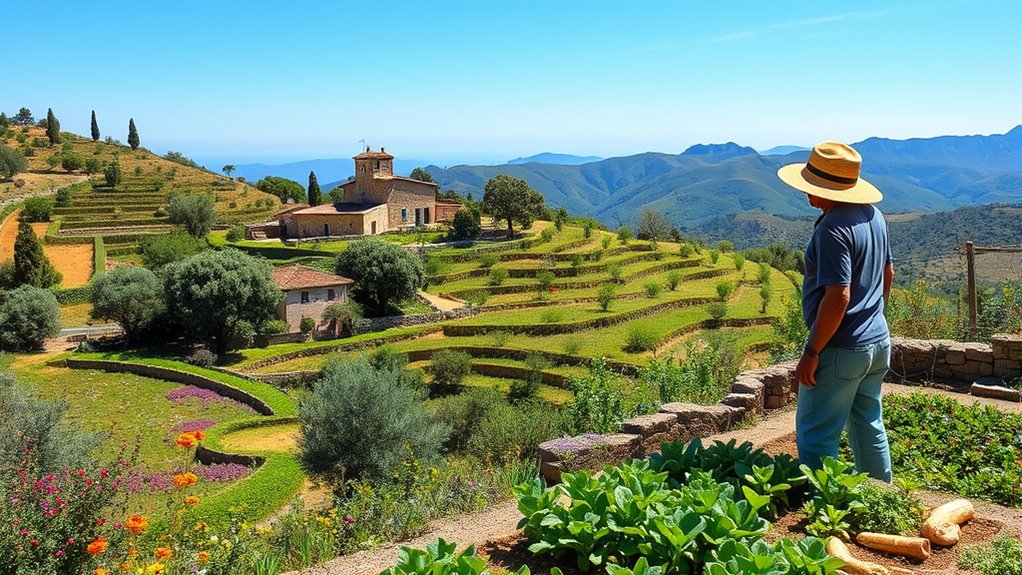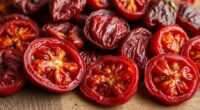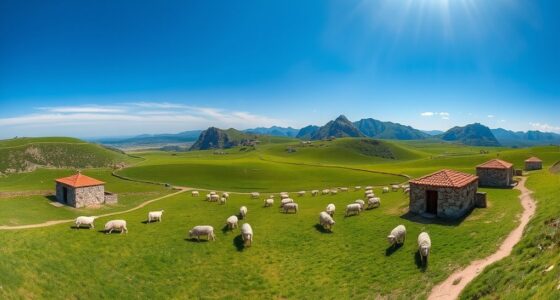In Sardinia, sustainable farming practices focus on organic methods, traditional techniques like terracing, and innovative tools such as vertical farming and precision agriculture. Farmers use natural soil enrichment, water conservation, and biodiversity preservation to boost resilience and environmental health. Community initiatives and policy support further encourage eco-friendly practices. If you want to explore how Sardinian farmers are combining tradition with innovation for a greener future, there’s plenty more to discover below.
Key Takeaways
- Sardinian farmers adopt traditional practices like terracing, cover cropping, and crop rotation to maintain soil health and prevent erosion.
- Organic farming in Sardinia emphasizes minimal chemical use, composting, and native crop cultivation to enhance sustainability.
- Innovative techniques such as vertical farming, precision agriculture, and solar-powered irrigation boost resource efficiency.
- Climate resilience is strengthened through water conservation, drought-resistant crops, and soil management projects.
- Community engagement and educational initiatives promote awareness and adoption of sustainable farming methods across the region.

JADAM Organic Farming (Second Edition) : Innovative organic farming technology established in Korea. No-till, Weed free, and High-Yield, Ultra-Low-Cost cultivation technologies that can dramatically help reduce the labor force. Make your own All – Powerful Natural Pesticides, microbial inputs, and fertilizers.
As an affiliate, we earn on qualifying purchases.
As an affiliate, we earn on qualifying purchases.
Sardinia’s Organic Farming Landscape and Growth Trends
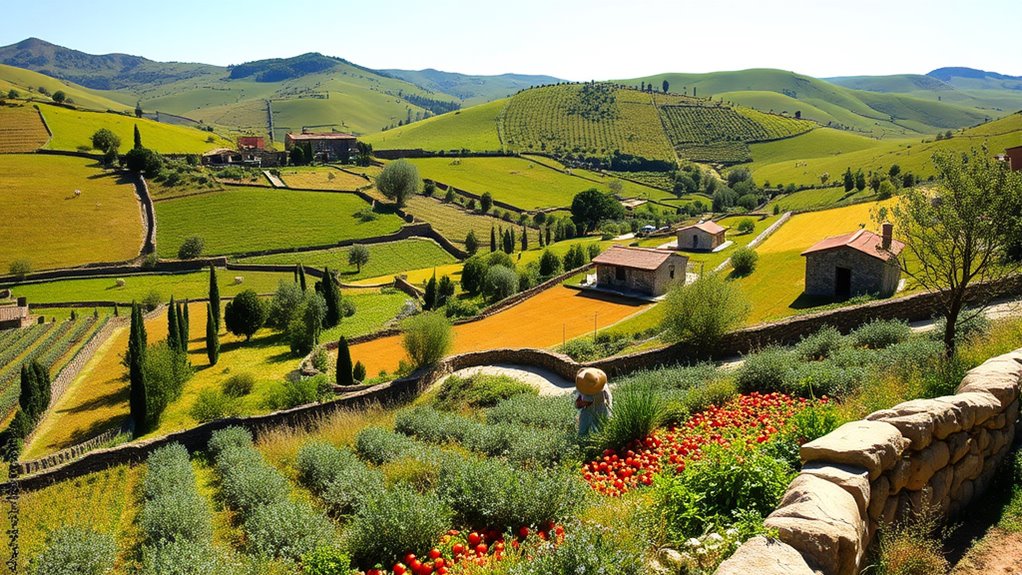
Sardinia is experiencing significant growth in its organic farming sector, reflecting a broader shift toward sustainable agriculture. You’ll notice the island’s organic farming area has increased by 2.4%, now covering 150,456 hectares. The number of organic operators has risen by 5.4%, showing more farmers are embracing organic methods. Sardinia ranks seventh in Italy for organic land, highlighting its growing importance in the national scene. This expansion results from existing farms scaling up and new operators entering the sector. The growth supports Italy’s overall organic market, which surpasses 6.5 billion euros in sales. As Sardinia’s organic sector develops, it contributes to Italy’s and the EU’s sustainability goals, strengthening regional rural economies and environmental efforts. Sardinia accounts for 12.7% of Italy’s total organic land, underscoring its substantial role in the national organic landscape.

ALTO GARDEN GX Hydroponic Tower | Vertical Planter Tower | Hydroponics Growing System Kit | Food Grade with 24 Net Pots (with LED Grow Lights)
[ALTO GARDEN FEATURES] Fully contained, self-watering and self-lighting hydroponics growing system. Tower walls are an industry-leading 2mm thick….
As an affiliate, we earn on qualifying purchases.
As an affiliate, we earn on qualifying purchases.
Natural Climate and Soil Benefits for Sustainable Agriculture
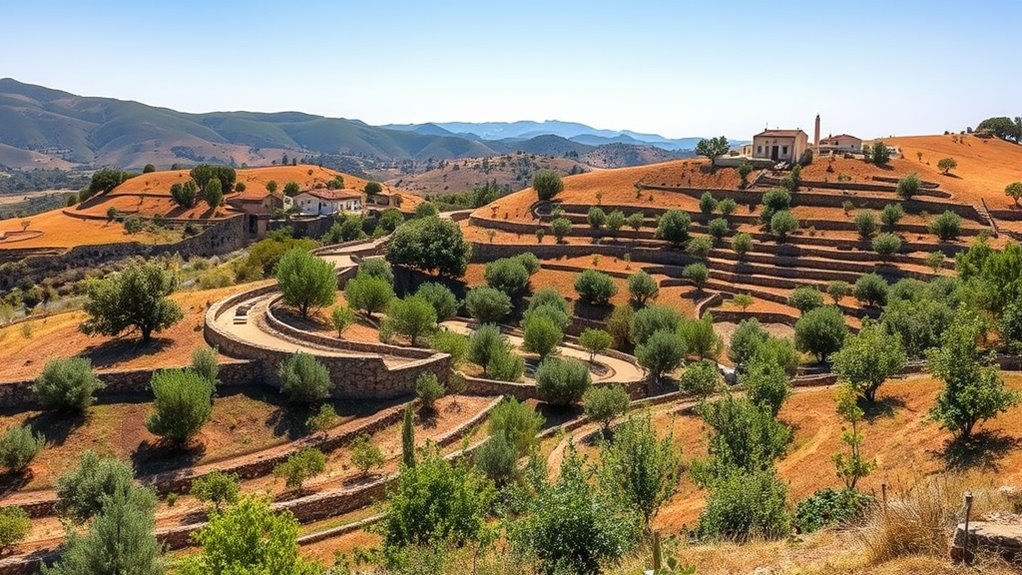
You can take advantage of Sardinia’s fertile soil and favorable climate to grow a wide variety of crops with fewer chemicals. The rich soil supports healthy plant development, reducing the need for synthetic inputs. By working with these natural benefits, you promote more sustainable and resilient farming practices. Additionally, the Mediterranean climate with long, warm summers creates ideal conditions for crop cultivation, allowing farmers to optimize growing seasons while minimizing environmental impact climate advantages. Embracing these natural factors can also encourage the adoption of sustainable agriculture methods that further protect the environment and enhance crop yields.
Fertile Soil and Climate
The Mediterranean climate, with its mild, rainy winters and warm, dry summers, creates ideal conditions for sustainable agriculture by supporting diverse crop growth and extending growing seasons. Your crops, like durum wheat, benefit from the long, warm summers that allow multiple harvests or longer maturation periods. Seasonal rainfall naturally replenishes soil moisture, reducing dependence on external water sources. Sardinian soils are naturally fertile, rich in nutrients from volcanic and calcareous origins, supporting crops with minimal inputs. Well-drained soils and smart irrigation techniques help maintain soil health and prevent salinity. Traditional practices like terracing and cover cropping protect against erosion, preserving soil quality. This synergy of climate and soil forms a resilient foundation for sustainable farming in Sardinia. The region’s climate and soils are naturally suited to organic and low-input farming methods, contributing to the region’s reputation for high-quality, environmentally friendly agricultural products.
Reduced Chemical Usage
How does reducing chemical use benefit sustainable agriculture? By cutting chemical pesticide use by about 30% through organic pest management, you help preserve beneficial insects, birds, and wildlife that naturally control pests. This balance boosts ecosystem health and reduces dependency on synthetic chemicals. Limiting chemical applications also minimizes water contamination, protecting surface and groundwater from harmful runoff. Organic practices encourage soil microorganisms, enhancing fertility and reducing erosion risk. Sardinian farmers share knowledge and collaborate to adopt these eco-friendly methods, strengthening community resilience. Additionally, chemical-free approaches support organic certifications, boosting local economies with products like cheese, wine, and meat. Initiatives like biopesticides and green biotechnology further reduce reliance on chemicals, promoting a healthier environment and ensuring long-term sustainability for Sardinian agriculture. Reducing chemical use also helps mitigate pesticide resistance in pests, supporting the long-term effectiveness of organic pest management strategies. Furthermore, adopting integrated pest management techniques optimizes pest control while minimizing chemical input, reinforcing sustainable practices.

Solar Automatic Drip Irrigation Kit System, JIYANG Solar Powered Auto Easy DIY Watering Device Supported Pots Plants, 6 Timing Modes with Anti-Siphoning Device (Supported 10 Pots, 6Timing Modes)
[Automatic Plant Watering Kit] It's powered by solar energy, can take water directly from containers such as buckets,…
As an affiliate, we earn on qualifying purchases.
As an affiliate, we earn on qualifying purchases.
Innovative Techniques Supporting Eco-Friendly Farming

What innovative techniques are transforming eco-friendly farming today? You can now see farms adopting vertical farming, which maximizes space, cuts water use, and boosts yields. Solar-powered irrigation harnesses renewable energy to conserve water efficiently. Crop rotation improves soil health and reduces disease, while biological pest control minimizes chemical reliance. Organic certification encourages chemical-free practices, supporting biodiversity and soil vitality. Additionally, Kia Tuning techniques such as ECU remapping and suspension upgrades exemplify how technological advancements can optimize performance and efficiency.

Rapitest Soil Test Kit for Gardens, Vegetables, Flowers and Lawns. USA designed and assembled soil tester completely, quickly and accurately measures/analyzes soil pH acidity and garden nutrients.
Quick, at home results for Soil pH, Nitrogen, Phosphorous and Potash Innovative and inexpensive soil test kit features…
As an affiliate, we earn on qualifying purchases.
As an affiliate, we earn on qualifying purchases.
Traditional Practices and Their Role in Sustainability
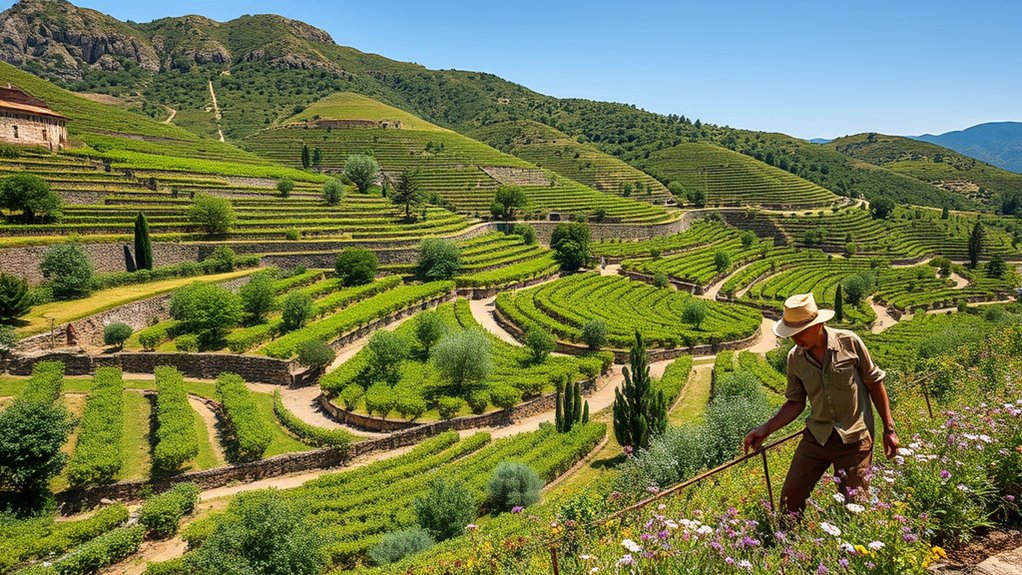
Have traditional practices played a crucial role in promoting sustainability in farming? Absolutely. Sardinian pastoralism centers on the indigenous Sarda sheep, emphasizing milk over wool and shaping land use through transhumance, the seasonal movement of herds. Although transhumance has declined, livestock management remains vital, adapting to ecological and market shifts. Crops like spelt and barley are cultivated to preserve biodiversity and cultural heritage, with soil fertility maintained through compost, manure, and crop rotation rather than chemicals. Natural pest control methods and water conservation techniques support ecological balance and drought resilience. These practices are deeply embedded in local culture, sustained through intergenerational knowledge transfer, community involvement, and landscape conservation. The Golden Age of Sardinian Pastoralism also saw expansion of territories through tradition and innovation, which continues to influence current sustainable practices. Additionally, local ecological knowledge plays a key role in adapting these methods to changing environmental conditions. Together, they foster a resilient, eco-friendly farming system rooted in Sardinia’s traditions.
Community Initiatives and Policy Measures Enhancing Sustainability
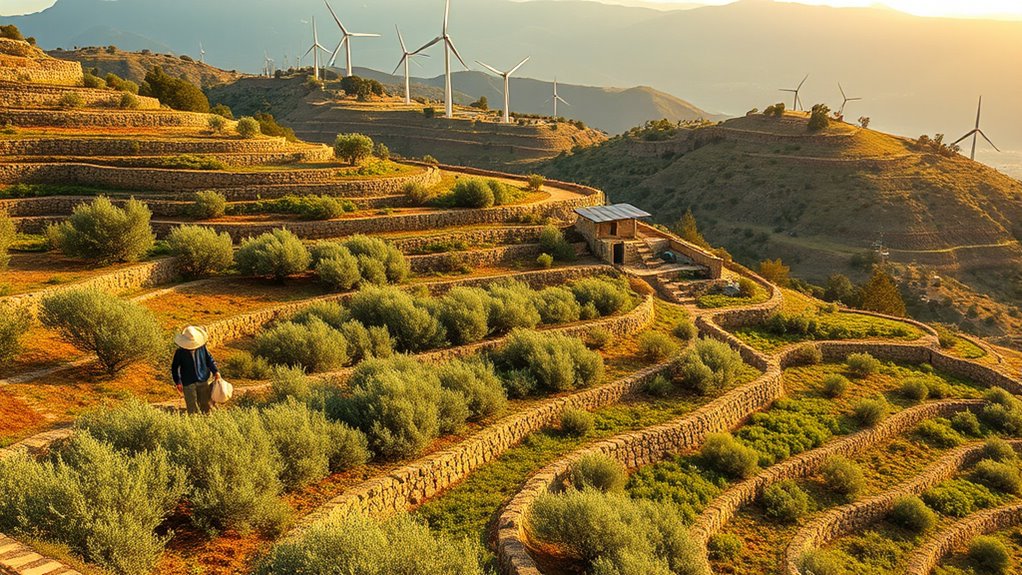
Community initiatives and policy measures substantially bolster sustainable farming practices in Sardinia by fostering collaboration and raising awareness among stakeholders. Local organizations, farmer associations, and environmental groups conduct workshops, campaigns, and training to promote eco-friendly practices and enhance understanding of environmental regulations. These efforts create a shared commitment to sustainability, encouraging farmers to adopt new techniques. The policies support participation in quality schemes, biodiversity contracts, and climate adaptation projects, benefiting thousands of farms. For example:
| Initiative | Focus Area | Impact |
|---|---|---|
| Sardinia’s RDP | Farm investments, biodiversity | Supports 94,000 hectares organically grown |
| Community workshops | Training and awareness | Increased adoption of sustainable methods |
| Public campaigns | Consumer awareness | Higher demand for eco-friendly products |
| Climate resilience projects | Water and soil management | Improved farm resilience to climate change |
| Cooperative models | Market strengthening | Enhanced local food systems |
These measures strengthen Sardinia’s path toward sustainability. Community engagement plays a crucial role in ensuring the long-term success of these initiatives. Additionally, ongoing research and innovation are vital to developing new sustainable farming techniques that further reduce environmental impacts.
Environmental Contributions and Carbon Sequestration Potential
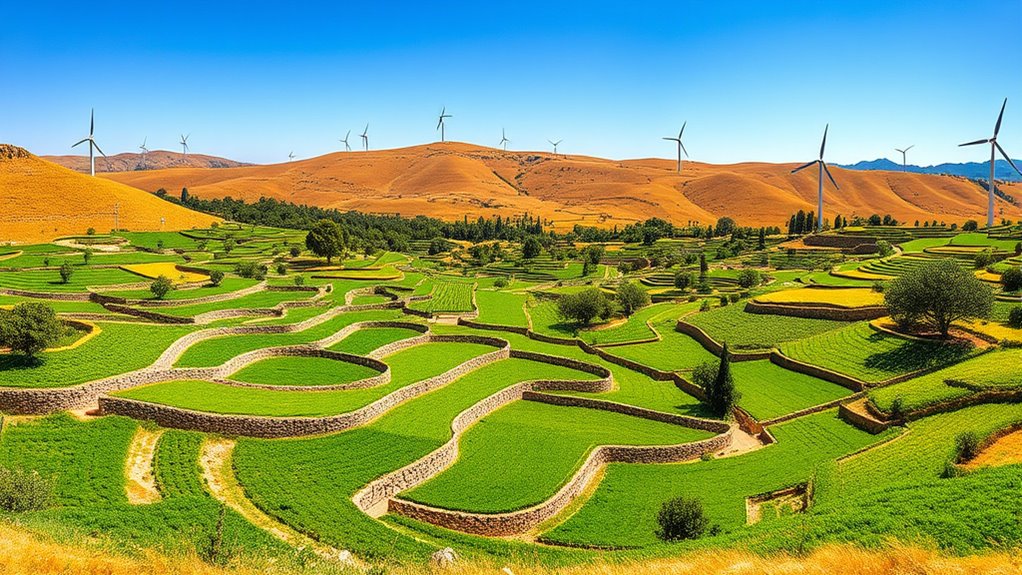
Sustainable farming practices in Sardinia actively contribute to environmental health and climate change mitigation by enhancing soil carbon storage, conserving biodiversity, and reducing greenhouse gas emissions. You can imagine:
- Rich, dark soils that hold more carbon, helping fight atmospheric CO2.
- Fields teeming with diverse plants and animals, supporting healthy ecosystems.
- Moist soils that retain water better, preventing erosion and drought.
- Habitats thriving with native species, maintaining natural ecosystem services.
- Soil analysis showing increased organic matter content due to sustainable practices, further boosting carbon sequestration, which highlights the importance of soil health in climate strategies.
These practices also lower emissions by reducing synthetic chemicals, using clean energy for irrigation, and protecting natural habitats. As a result, Sardinian farmers create resilient landscapes that sequester carbon and promote ecological balance, helping combat climate change and preserve the environment for future generations.
Overcoming Challenges to Expand Organic and Sustainable Practices
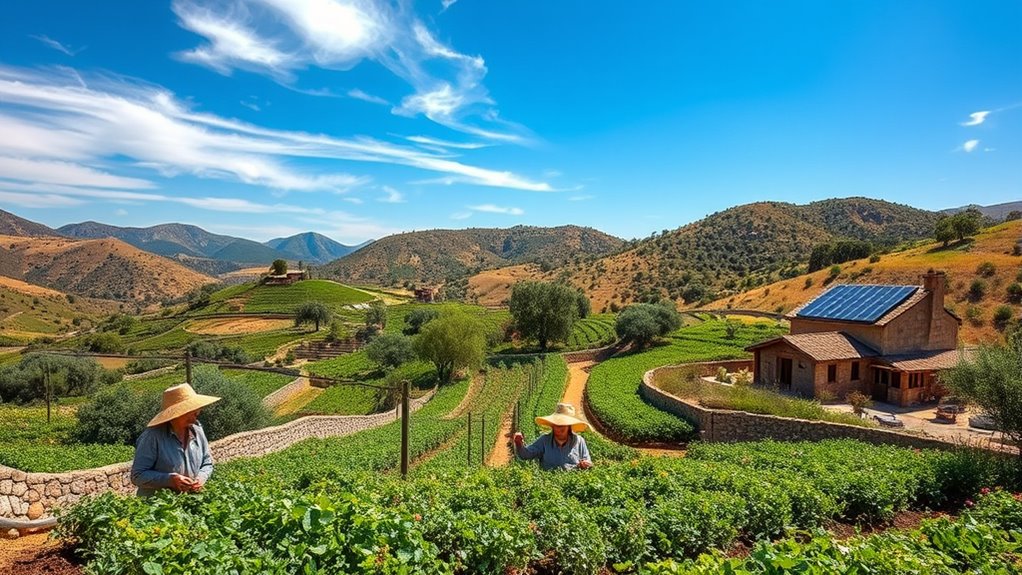
Expanding organic and sustainable farming practices in Sardinia requires overcoming significant geographic, economic, and policy hurdles. The region’s landscape, dominated by pastures and grazing meadows, limits crop diversification, with less than 10% of land dedicated to organic farming—below Italy’s national average. Large livestock areas complicate crop rotation and certification processes, while dispersed farms hinder supply chain development. Economically, organic milk faces high costs and little price premium, discouraging farmers from switching. Market demand remains low, and accessing credit or subsidies is challenging, reducing investment incentives. Climatic risks like drought and weather variability threaten soil health and pasture quality. Policy support is insufficient, with complex subsidy schemes and limited funding, making it harder for small-scale farmers to adopt and expand organic practices. Moreover, the region’s rugged terrain and limited infrastructure further impede the expansion of sustainable practices across the island.
The Role of Consumer Awareness and Market Development
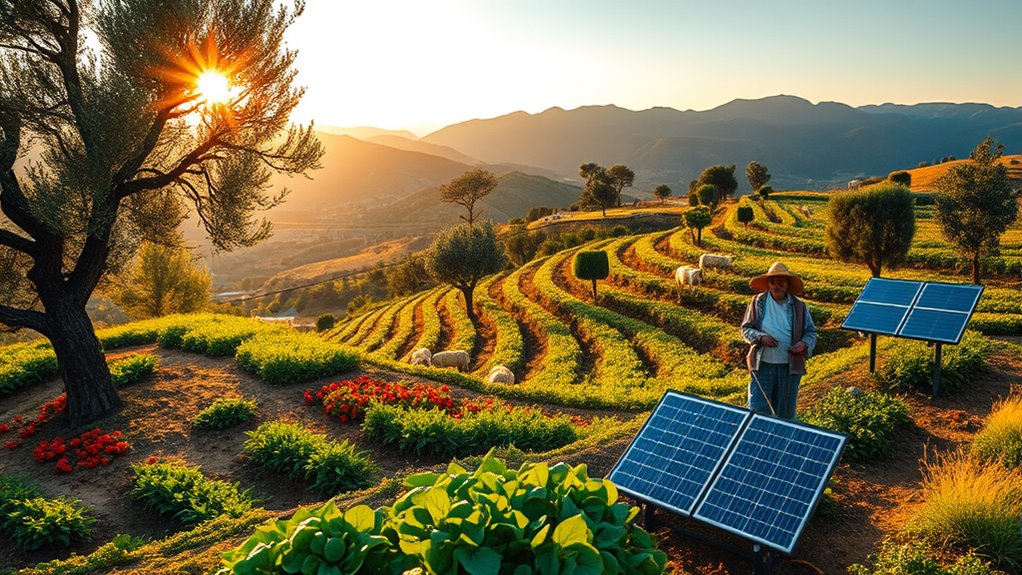
Your awareness of sustainable farming influences market growth, as more consumers seek organic and eco-certified products. Education efforts help you understand the benefits and foster trust in local, natural methods. This shift in consumer demand encourages farmers to expand sustainable offerings and access new markets. Additionally, increasing public knowledge about the environmental impacts of different farming systems supports more informed purchasing decisions. Understanding agroecological practices can further empower consumers to make choices that promote biodiversity and soil health.
Growing Organic Market
Have you noticed how increasing awareness about health and environmental issues is fueling demand for organic products? This shift is transforming Sardinia’s market in several ways:
- More consumers seek sustainably farmed foods, boosting sales in local supermarkets and markets.
- Awareness campaigns and food summits like Rivoluzione Bio make organic options more visible and trusted.
- The rise of organic restaurants and canteens expands access, encouraging healthier choices outside homes.
- Sardinian producers leverage Italy’s “Made in Italy” reputation, convincing buyers to pay premiums for quality and authenticity.
- The overall growth of organic farmland and producers in Italy supports a robust supply chain, ensuring consistent availability of organic products Italy’s expanding organic land and producer base.
As a result, the domestic retail sector flourishes, and export opportunities grow. This market development supports Sardinia’s push toward sustainable farming and enhances its global organic footprint.
Education Drives Demand
Did you know that education plays a crucial role in shaping consumer preferences for sustainable farming? When you learn about the environmental and social benefits of responsible food choices, you’re more likely to seek out local, sustainably produced products. Sardinian farm education programs, including workshops, farm visits, and experiential activities, help you build emotional connections with producers and understand sustainable practices firsthand. These initiatives increase awareness of eco-friendly farming, conservation, and food security, encouraging you to support brands that prioritize sustainability. Experiential learning as part of these programs enhances your understanding and commitment to sustainability, making you a more conscious consumer. As your knowledge grows, so does demand for responsibly farmed foods, which motivates farmers to adopt greener practices. This cycle strengthens local food networks, boosts market development, and ensures the long-term viability of sustainable agriculture in Sardinia.
Future Opportunities for a Greener Sardinian Agriculture
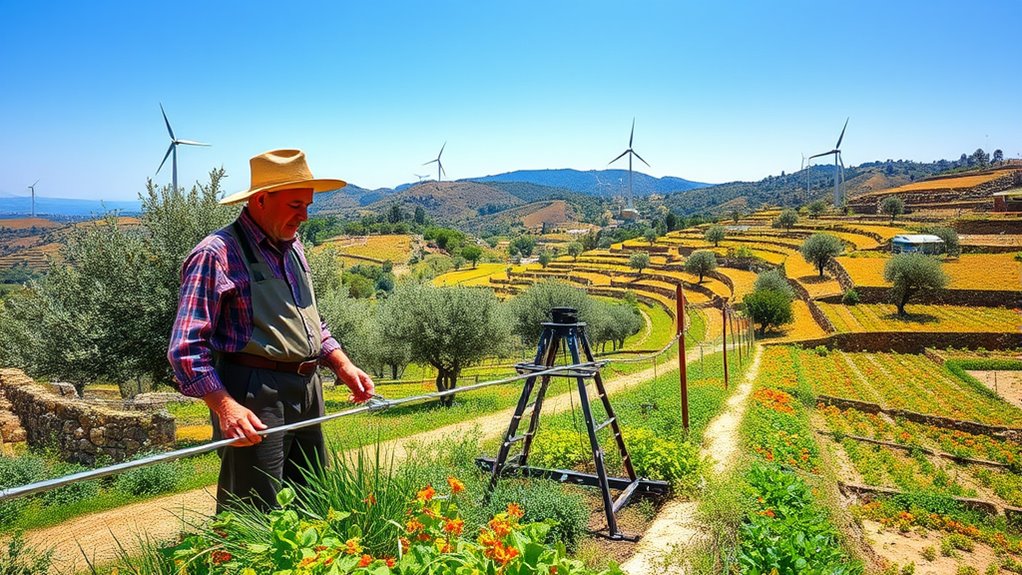
What opportunities lie ahead for making Sardinian agriculture more sustainable? You can harness several promising pathways. First, imagine $3.37 billion supporting farmers through policies that boost digital tools, climate resilience, and organic farming, transforming landscapes. Second, visualize precision agriculture with smart technologies and methane-powered tractors reducing emissions while optimizing resources. Third, consider climate adaptation measures like drought-resistant crops, improved irrigation, and agroforestry, ensuring farms withstand water scarcity. Fourth, think of consumer-driven market growth for organic, traceable Sardinian products, fueling local economies and reinforcing regional identity. This increased investment can also promote the adoption of eco-friendly practices among smallholder farmers. These initiatives collectively create a fertile ground for a resilient, eco-friendly future where Sardinian farmers thrive while protecting the environment. The opportunities are vast—your role in embracing these changes is key to a greener Sardinian agriculture.
Frequently Asked Questions
How Do Sardinian Farmers Access Funding for Sustainable Farming Upgrades?
You can access funding for sustainable farming upgrades in Sardinia by leveraging regional and EU programs, like the Rural Development Programme, which offers grants for modernization, innovation, and eco-friendly practices. Partnering with NGOs or joining cooperatives helps you tap into additional resources and support networks. These collaborations can boost your chances of securing funds, improve your farm’s sustainability, and allow you to invest in eco-friendly infrastructure and organic farming practices effectively.
What Specific Training Programs Support Organic Farmers in Sardinia?
You can access various training programs that support organic farmers in Sardinia. These include farm apprenticeship programs offering hands-on experience in organic farming techniques like permaculture and agroforestry. There are also workshops and courses focused on organic gardening, livestock management, and eco-friendly practices. Additionally, volunteering opportunities on farms help you gain practical skills. These programs aim to develop your expertise, promote sustainability, and connect you with local agricultural communities.
How Is Water Quality Monitored and Maintained in Organic Farms?
They say, “An ounce of prevention is worth a pound of cure,” and that’s true for water quality in organic farms. You regularly sample irrigation water, testing for bacteria like *E. coli* and pathogens such as *Pseudomonas aeruginosa*. Filtration and monitoring before and after water use help catch issues early. Combining land use data and vulnerability assessments, you make certain water stays clean, safeguarding both your crops and health.
What Are the Main Barriers for Small Farmers Adopting Sustainable Practices?
You’ll find that small farmers face several barriers when adopting sustainable practices. Limited access to modern technologies and high certification costs make it tough to shift. Financial hurdles like expensive investments and lack of affordable credit slow progress. Additionally, bureaucratic red tape, weak government support, and traditional mindsets hinder change. Without proper training, market access, or community networks, it’s challenging to overcome these obstacles and fully embrace sustainable farming methods.
How Do Consumer Preferences Influence Sustainable Farming Policies in Sardinia?
Did you know over half of Europeans are willing to pay a premium for fossil-free foods? Your preferences greatly influence policies, as rising demand for eco-labeled and climate-friendly products encourages governments to support sustainable farming. By choosing sustainable options, you help shape certification standards, promote transparency, and push for policies that incentivize environmentally friendly practices. Your consumer choices are key drivers in creating a more sustainable agricultural future.
Conclusion
By embracing sustainable farming, you can transform Sardinia into an ecological paradise rivaling the most vibrant and lush landscapes on Earth. Your choices support healthier soils, cleaner air, and a resilient environment that will thrive for generations. As you champion organic practices and innovative techniques, you become part of a movement that can turn this island into a shining beacon of sustainability, proving that your actions truly have the power to reshape our planet’s future.
